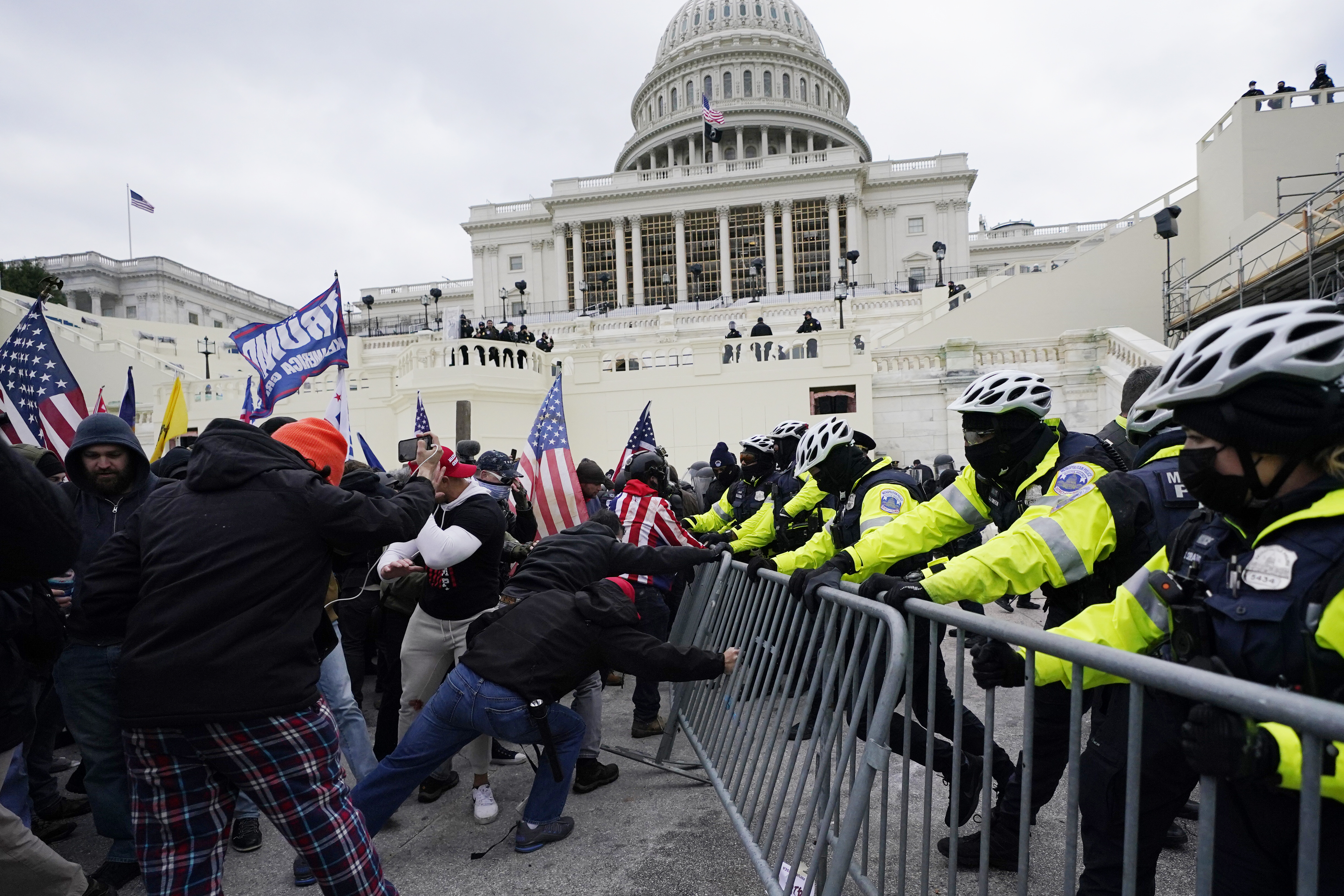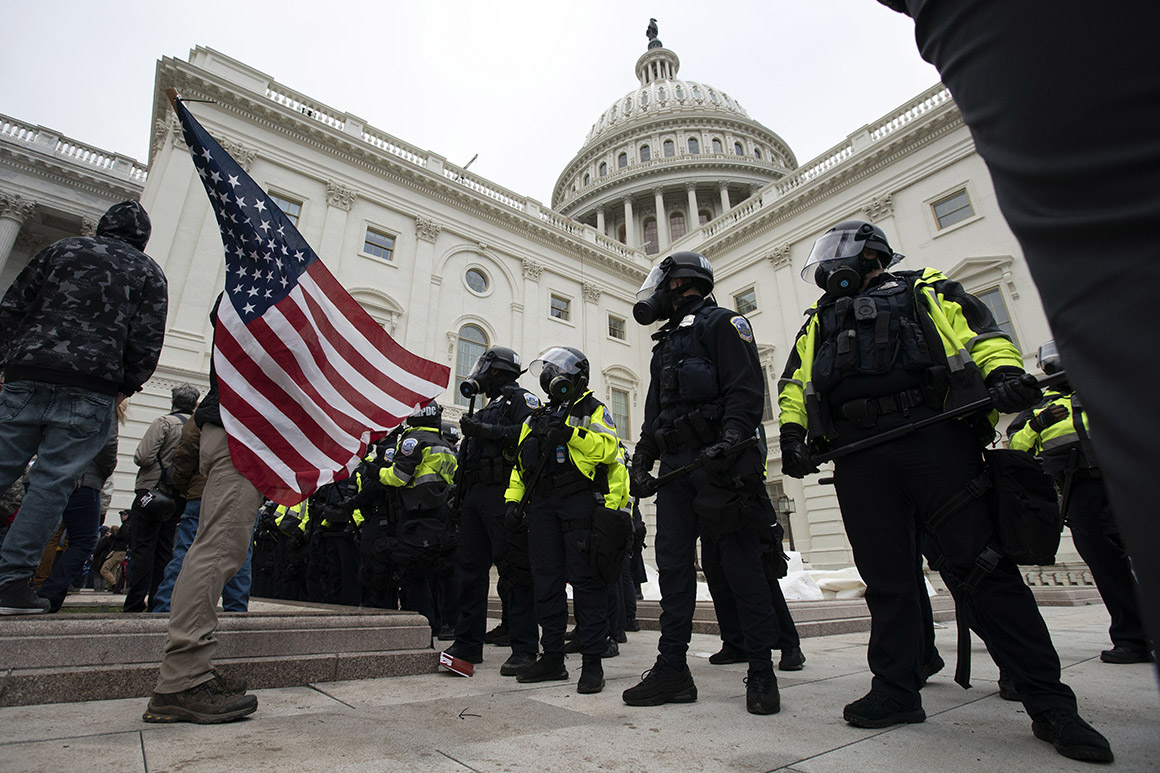Congress
Inside how the Capitol Police has changed since Jan. 6, 2021

As Congress prepares to certify another election on Jan. 6, the U.S. Capitol Police looks like a vastly different agency than it was ahead of the attack on the Capitol four years ago.
Security officials on Blue Light News were widely excoriated for the lack of preparedness ahead of the attempted insurrection, prompting multiple high-level resignations in the following weeks. An oft-repeated criticism was that officials should have requested help prior to the attack, given clear signals that there would be a huge protest coming to the area with the potential to turn violent. Those issues coincided with a steep increase in violent threats made against members of Congress.
With that in mind, Capitol Police Chief Tom Manger has sought to shift the agency’s identity as a traditional police force with a focus on Capitol Hill to a “protective force” built on intelligence gathering, threat assessment and flexing its nationwide authority and jurisdiction. It now has an intelligence bureau with dozens of agents, as well as field offices in Florida and California, with more possible in Massachusetts, Wisconsin and Texas.
But those shifts come at a cost. Capitol Police now operates with a $791.5 million budget, up more than 70 percent since the Capitol attack. Even accounting for inflation, that’s more than seven times the 9/11-era budget. Total spending is expected to reach $1 billion in the next few years, with officials requesting another 14 percent increase for next year’s budget.
“If all we had to do was protect the members of Congress on Capitol grounds, our budget would be a fraction of what it is,” Manger said in a recent interview. “We’ve got to protect the members of Congress all over the country.”
That has prompted some lawmaker questions about oversight. While Congress is the one that greenlights that funding, there’s an inescapable conflict given members’ increased fears for their own safety. No lawmakers publicly criticize USCP for its additional efforts to protect members — a difficult and complex task — but some would like to see transparency ramp up as more cash flows to the department, wondering if the increased money has really translated to increased safety.
“I think we need a lot of oversight on the United States Capitol Police processes, and that includes budget,” said Rep. Morgan Griffith (R-Va.), who sits on the House Administration Committee. “We need to be more active. And we need more transparency coming from leadership.”
In addition to the intelligence gathering operations, the new money has also gone toward addressing staffing shortages and attrition, with mixed results. Capitol Police leaders were already trying to grow the department before Jan. 6, as many of the officers were approaching retirement eligibility. Then hundreds more officers left en masse after the attack, too. Capitol Police officials now say that the first responder’s unit, expanded bicycle team, crowd management and civil disturbance units are “now appropriately trained and equipped.” While the department is still recruiting aggressively, staff has grown by between 300 and 400 employees since the riot, not counting hundreds of others hired to backfill retirements and attrition.
Back in December 2021, the FBI and multiple law enforcement agencies from NYPD to Washington State had raised concerns about the possibility that Donald Trump’s supporters would turn violent on Jan. 6. Capitol Police’s own intelligence unit saw social media posts about a plot to breach the complex — complete with maps of the building’s tunnels and explicit threats of violence against members of Congress.
But on Jan. 5 2021, guidance circulated within Capitol Police that “at this time there are no specific known threats related to the Joint Session of Congress Electoral College Vote Certification.” It couldn’t have been further from the truth or more disconnected from various intelligence, including the department’s own.

After years of expansion and training, Manger now describes the capabilities of the intelligence bureau of USCP as “world class.” He said it includes social media, emails, telephone calls and every other avenue for threats that are made against members and the Capitol. Manger told senators last week that the department has implemented all of the official recommendations for changes to USCP made by lawmakers in the wake of the attack.
One key area they’re still trying to expand is threat assessment teams that handle the growing threats against lawmakers. Manger estimated that, in 2024, threats will eclipse previous years to “well over 8,000” against members and the Capitol complex, compared to just 1,000 to 2,000 a decade ago. He said that despite increased staffing, caseloads for the special agents investigating the threats are still too high. There’s also significant turnover in these high-pressure roles that are outside the protection of the Capitol Police union.
“This has been a really, really difficult cycle for a number of members whose families have been threatened,” Rep. Annie Kuster (D-N.H.) said. “They have death threats out for them, they have to have special security.”
Capitol Police also monitors residential security for members of leadership — changes were made to that process after the attack on Paul Pelosi in former Speaker Nancy Pelosi’s San Francisco home last year. There has been a drumbeat of demand from lawmakers for more protection when they are outside the heavily protected Capitol grounds, whether in their districts, in transit and especially at events where many members gather together and could be targeted.
“We’re concerned about the safety of our family members, ourselves and our staff both here locally and in our district offices and our homes,” said Legislative Branch Appropriations Subcommittee ranking member Rep. Adriano Espaillat (D-N.Y.). “This is escalating … it’s nasty out there.”
Capitol Police insist these changes have made them better equipped to deal with threats. Manger called their responsibility to protect lawmakers a “24/7 no-fail mission” and said that has required more officers, training and administrative staff — all of which takes more money.
But concerns about oversight remain. After the 2021 attack, both lawmakers and outside groups urged an overhaul of the oversight apparatus for the USCP, which largely falls to the Capitol Police board. The halting and uncoordinated response of the board while Blue Light News was overrun drew calls for restructuring.

The 141-year-old board — which is made up of the House and Senate sergeants at arms and the architect of the Capitol, with a nonvoting presence by the Capitol Police chief — was built to encourage a deliberative decision-making process, not for responding quickly to a violent crisis on the Capitol’s doorstep. Resignations and firings led to a wholesale replacement of the board after the attack, but the structure remains unchanged.
“Do I think that there’s tweaks that could be made to make the whole sort of oversight system a little better? Absolutely,” Manger said. But “I’m trying to work within that structure.”
Not everyone is so sure those changes have helped matters. Griffiths said that USCP still has issues with being transparent with lawmakers who are explicitly tasked with overseeing the department, saying “my assessment is that it is not improving.”
“Congress propelled Capitol Police funding and manpower into the stratosphere but failed to launch the accountability mechanisms that would keep the police on mission,” longtime transparency advocate Daniel Schuman from the American Governance Institute said in a recent interview.
Meanwhile, Capitol Police funding has been on a steady upward climb since 1998, when a gunman bypassed a security checkpoint and killed two USCP officers in his attempt to enter the Capitol office suite of then-Majority Whip Tom DeLay. The Capitol Police began seeking — and receiving — a reliable series of budgetary increases which have not slowed.
The Capitol Police are requesting $906 million, a 14 percent increase over current funding levels for fiscal 2025. The department’s funding will be finalized as lawmakers negotiate a spending deal in the new year.
Jordain Carney and Nicholas Wu contributed to this report.
Congress
Former FBI and CIA head prods Senate to reject Patel, Gabbard
A former head of the FBI and CIA is raising objections over whether Kash Patel and Tulsi Gabbard, President-elect Donald Trump’s picks to be directors of the FBI and national intelligence, respectively, are qualified to serve in the Cabinet.
In a letter to senators on Thursday, William Webster, the only person to lead both the FBI and CIA, wrote that neither nominee meets the demands of top intelligence jobs.
Webster, who is 100 years old, praised Patel’s patriotism but wrote that his allegiance to Trump was concerning.
“His record of executing the president’s directives suggest a loyalty to individuals rather than the rule of law — a dangerous precedent for an agency tasked with impartial enforcement of justice,” he said.
When it came to Gabbard, Webster wrote that her “profound lack” of intelligence experience stood in contrast to the seasoned leadership needed for the role.
“Effective management of our intelligence community requires unparalleled expertise to navigate the complexities of global threats and to maintain the trust of allied nations,” he wrote. “Without that trust, our ability to safeguard sensitive secrets and collaborate internationally is severely diminished.”
Trump’s transition did not immediately respond to a request for comment.
Webster was appointed FBI director in 1978 by President Jimmy Carter and remained director under President Ronald Reagan until 1987. Reagan tapped him to be head of the CIA until 1991, under President George H.W. Bush.
“I urge you to weigh the critical importance of nonpartisan leadership and experience,” Webster wrote. “The safety of the American people — and your own families — depends on it.”
Congress
Freedom Caucus chair: House GOP needs to consider if ‘current leadership is what we need’
House Freedom Caucus Chair Andy Harris told Fox Business on Thursday that the chamber’s Republicans need to consider if current leadership “is what we need” going into unified GOP government next year.
“Before the last couple of weeks, I was in his corner, but now we should consider what’s the best path forward,” Harris (R-Md.) said of Speaker Mike Johnson. “We do need to consider whether — if we’re going to advance Mr. Trump’s agenda — whether the current leadership is what we need.”
Harris’ comments come after he signaled last week that he was on the fence about whether or not to support Johnson during the Jan. 3 speaker vote, saying in a statement that he was “now undecided on what House leadership should look like in the 119th Congress.”
Johnson is on thin ice with his right flank after his handling of short-term government funding. Though the speaker kept opposition on the final proposal, which will fund the government until mid-March, at only 34 GOP no votes, he sparked conference-wide frustration over his handling of the funding debate.
The growing ire toward Johnson is coming at a bad moment for the Louisiana Republican’s political future. Because Republicans are expected to have a 219-215 majority on Jan. 3, due to Matt Gaetz’s early resignation, Johnson can only afford to have one Republican vote against him.
Rep. Thomas Massie (R-Ky.) became the first Republican to vow to vote for someone else. But several Republicans, including Harris, have said they are undecided or have refused to say if they will support Johnson in the wake of the continuing resolution.
Some of Johnson’s allies have publicly urged Trump to back him before the vote to help shore up his support and reduce the chances of a protracted speaker gavel fight. They’ve also warned that if they can’t quickly settle the speaker race, they risk not being able to certify Trump’s electoral college win on Jan. 6.
Johnson has worked hard to keep Trump on his side. And while the president-elect hasn’t publicly crossed Johnson since the funding debate, one Trump adviser told Blue Light News earlier this month that there wouldn’t be pushback if someone challenged Johnson.
Harris on Thursday said that Trump is going to need “strong leadership” given House Republicans’ thin margins and floated that the incoming president is “evaluating whether that exists.”
Though Harris said on Thursday that he was supporting Johnson until his handling of the spending debate, he floated Judiciary Chair Jim Jordan (R-Ohio) as a potential speaker candidate during a campaign stop with outgoing Rep. Bob Good (R-Va.) and other Freedom Caucus members in March. Jordan has repeatedly said that he is not running for the speaker’s gavel, or any other leadership position.
“I like Jim Jordan. I think he should have a shot at being speaker. I think he will have a shot at being speaker after the election,” Harris said in March, while explaining why he didn’t support a potential ouster vote against Johnson at that time.
Jordan was one of the GOP’s speaker nominees last year in the wake of Speaker Kevin McCarthy’s ouster but he was unable to get 218 votes on the floor.
Congress
Meet the new members: From governor to rank-and-file senator
The new member: Sen.-elect Jim Justice (R-W.Va.)
How they got here: Justice, West Virginia’s sitting governor, easily defeated Democrat Glenn Elliott by more than 40 percentage points to flip control of this Senate seat for Republicans.
Inside the campaign: Since announcing his Senate bid in April 2023, Justice was the heavy favorite for this key GOP flip opportunity. He easily dispatched Rep. Alex Mooney (R-W.Va.) in the GOP primary by more than 35 percentage points.
Justice is termed out as governor, making the Senate a tempting opportunity. His push got even easier when longtime Sen. Joe Manchin (I) announced he would not run for reelection. “I will tell you just this, with all in me, you shook up the world, we shook up the world … and now the challenges are unbelievable with what’s going on in D.C.,” Justice said at his victory speech.
The issues he’ll focus on: Justice has told reporters in West Virginia he hopes to nab spots on the Finance and Energy committees. He’s been especially critical of the Biden administration for its policies on energy and the southern border, topics he’s sure to focus on once a member of the Senate.
One non-policy matter of interest will be Justice’s attendance. People from both political parties detailed the governor’s iffy attendance record in the state to POLITICO earlier this year. Others fear health issues could complicate his participation in routine Senate business.
Background: Justice is one of the wealthier people in West Virginia, having inherited a coal mining company and owning the financially troubled Greenbrier luxury resort.
He won election to the governor’s office in 2016 as a Democrat but quickly reversed course and became a Republican less than seven months later. He easily won reelection in 2020 and has enjoyed high approval ratings throughout his tenure as governor.
Campaign ad that caught our eye: Justice encouraged folks to vote early in the Senate race alongside his omnipresent pet dog, Babydog. “Bring it home for Babydog and I,” he said.
Fun fact: Justice has been head coach of the girls basketball squad at Greenbrier East High School in Fairlea, West Virginia, since 2003, a position he’s steadily maintained even while governor.
We’re spotlighting new members during the transition. Want more? Meet Reps.-elect Wesley Bell (D-Mo.) and George Latimer (D-N.Y.).
-
Economy2 months ago
Fed moves to protect weakening job market with bold rate cut
-

 The Josh Fourrier Show2 months ago
The Josh Fourrier Show2 months agoDOOMSDAY: Trump won, now what?
-
Economy2 months ago
Harris dismisses Trump as ‘not serious’ on the economy in BLN interview
-
Congress2 months ago
Trump’s border czar promises ‘hell of a lot more’ deportations than first term
-
Health Care2 months agoAnti-abortion forces broke the left’s post-Roe winning streak, but 7 more states enacted protections
-
Economy2 months ago
It’s still the economy: What TV ads tell us about each campaign’s closing message
-
Health Care2 months ago
More abortion ballot measures are set to pass. Then state courts will have their say.
-
Economy2 months ago
Biden touts economic gains, acknowledges a long way to go






